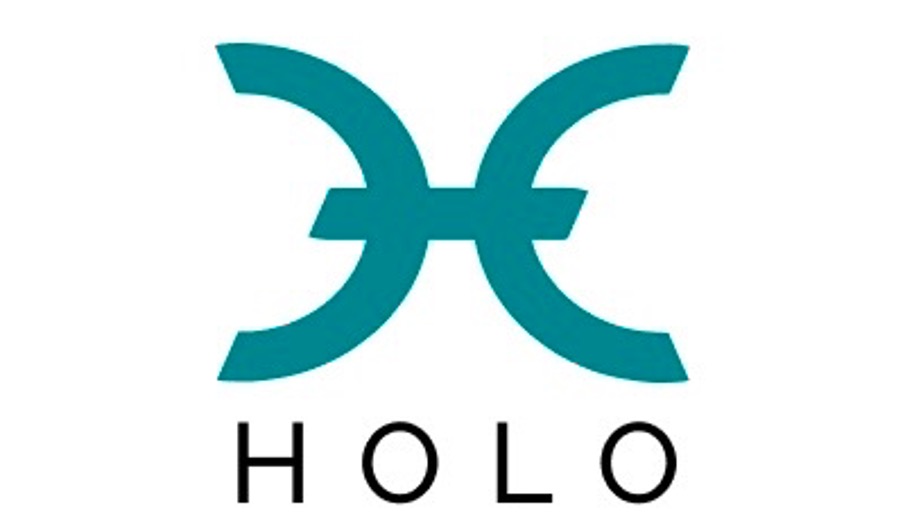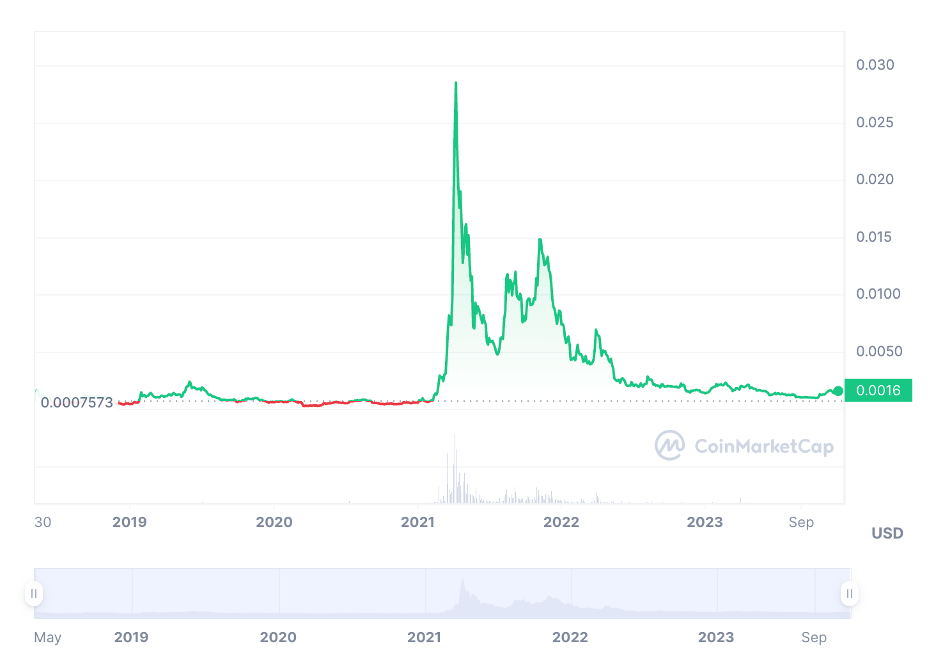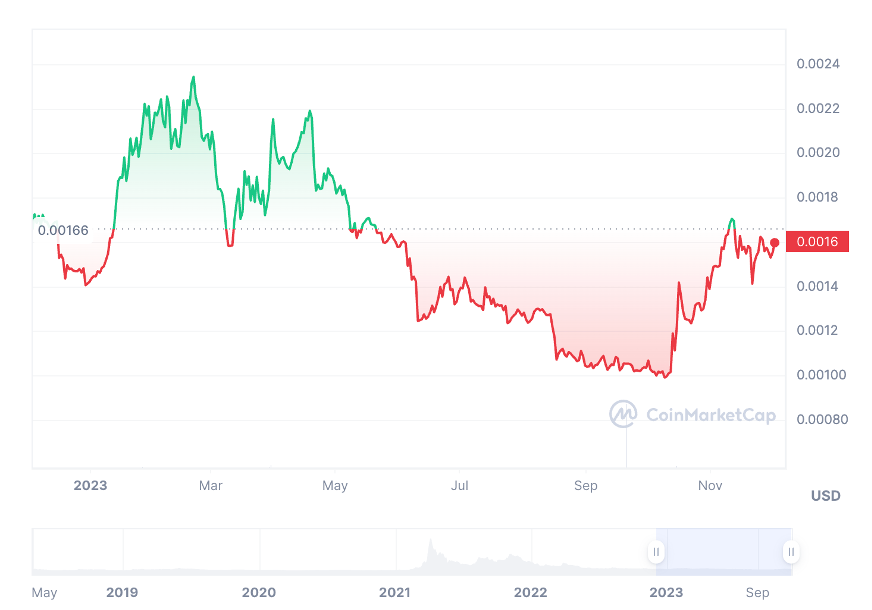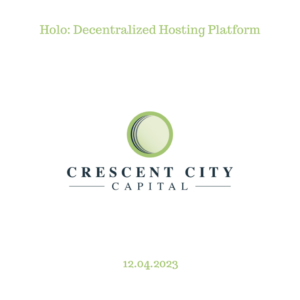Holo: Decentralized Hosting Platform
By Yvonne Zhang | Crescent City Capital Market Analyst Intern

What Is Holo (HOT)?
Holo, operating with its native token HOT, represents a paradigm shift in the decentralized application space. Founded by Arthur Brock and Eric Harris-Braun, Holo aims to bridge the gap between the broader internet and decentralized applications. The platform’s unique selling proposition is its non-reliance on traditional blockchain technology, opting instead for a more decentralized, efficient, and scalable approach. Holo is built on Holochain, a framework that allows for decentralized app development without blockchain. Each DApp on Holochain has its own set of validation rules and local hash chain, ensuring security and efficiency. The platform’s main utility token, HoloFuel, is designed for microtransactions and is expected to facilitate a vast number of simultaneous transactions.
Key Features
Decentralization: Holo’s architecture ensures a high degree of decentralization, reducing risks associated with centralization.
Scalability: The unique framework allows for scalable application performance, not limited by traditional blockchain constraints.
Security: End-to-end encryption and individual DApp validation rules enhance the platform’s security.
Non-Blockchain Technology: Unlike traditional cryptocurrencies like Bitcoin (BTC) and Ethereum (ETH), Holo is built on Holochain, a framework that does not rely on blockchain technology. This approach allows for a more scalable and efficient system for decentralized applications (DApps).
Peer-to-Peer Distribution Platform: HOT operates as a peer-to-peer distribution platform, facilitating the use of Holochain applications. This structure is designed to offer more efficient, faster, and cost-effective solutions compared to traditional blockchain-based platforms.
Ease of Transactions: Holo focuses on providing users with efficient information processing, making transactions faster and more straightforward.
Light, Fast, and Cheaper Applications: The platform is tailored for applications that require less computational power and resources, offering a more lightweight solution compared to the often resource-intensive blockchain applications.
Founders of Holo
Holo, the decentralized hosting platform, was co-founded by Arthur Brock and Eric Harris-Braun, both highly experienced in the realm of contract coding. Their collaboration on Holo began in December 2016, under the umbrella of the MetaCurrency Project, an initiative focused on developing tools and technologies for a future peer-to-peer (P2P) economy. The design and conceptual framework of Holo draws inspiration from Ceptr, a cooperative P2P framework for decentralized applications (DApps), which was a previous project of both founders.
Together, Brock and Harris-Braun’s combined experience and vision have been instrumental in shaping Holo into a platform that aims to redefine the landscape of decentralized applications and the broader P2P economy.
How is the Holo Network Secured
The Holo network employs a distinctive security architecture that sets it apart from traditional blockchain-based systems. Central to its approach is the decentralization of validation mechanisms. Unlike conventional blockchain networks that rely on a global consensus, Holo allows each decentralized application (DApp) on the Holochain framework to operate with its own unique set of validation rules. This means the integrity and security of each DApp are independently maintained, reducing reliance on a single, overarching consensus protocol. Each DApp on Holo maintains its local hash chain for storing cryptographically signed records, ensuring that data and transactions within the application are securely recorded and tamper-evident.
Security in the Holo network is further enhanced through a peer-to-peer validation process. When data is transmitted across the network, it is validated by random peers, who verify that the data adheres to the specific rules of the DApp. This distributed approach to validation not only bolsters security but also spreads the responsibility across multiple nodes, making the system more resilient. Additionally, Holo employs a gossip protocol among these nodes, which is crucial for efficiently sharing validated data across the network. This protocol also plays a key role in identifying and alerting the network about bad data or malicious actors, enabling the network to effectively blacklist such entities.
Moreover, the connections between hosts (those who provide computing power and resources for DApps) and the applications themselves are secured through end-to-end encryption. This ensures that data remains secure and private as it traverses the network. The infrastructure of Holo is underpinned by a globally distributed network of servers, which further mitigates the risks associated with centralization by ensuring that the network is not concentrated in any single location or under the control of any single entity.
In essence, Holo’s security framework is characterized by its decentralized approach, local hash chains for DApps, peer-to-peer validation, the use of gossip protocols for data integrity, end-to-end encryption, and a globally distributed server network. These features collectively create a robust and secure environment for hosting decentralized applications, aligning with Holo’s core philosophy of maintaining maximal decentralization to minimize the risks associated with centralized control.
Recent Updates
The live Holo price on Dec 2nd is $0.001626 USD with a 24-hour trading volume of $9,593,733 USD. Holo is up 4.54% in the last 24 hours. The current CoinMarketCap ranking is #146, with a live market cap of $280,494,657 USD. It has a circulating supply of 172,459,784,703 HOT coins and the max.

Analysis:
The price trajectory of Holo (HOT) from 2021 to 2022 has been notably volatile, with the cryptocurrency experiencing significant fluctuations. A key moment in its price history was on April 5, 2021, when it reached a historical peak of $0.02847. This volatility is not uncommon in the cryptocurrency market, but Holo’s journey is particularly noteworthy due to its late entry into the market compared to other cryptocurrencies. Despite this late start, Holo has shown potential as a viable investment, especially for those with a long-term perspective, as its short-term growth has been relatively slow.
Holo’s price movements have been closely tied to market sentiment and trends, a common characteristic in the volatile cryptocurrency market. However, specific developments within the Holo project have also played a significant role in its price dynamics. A notable example of this was the surge in Holo’s price in early April 2021, following the announcement that Holo Limited had been granted a US patent for the rrDHT networking innovations within Holochain. The rrDHT, which stands for a relaxed, agent-centric distributed hash table, is a peer-to-peer networking design implemented in Holochain. This patent was a significant milestone for Holo, highlighting its innovative approach to decentralized networking and application development.
Despite a moderation in its price following the initial excitement of the patent news, there is optimism about Holo’s future potential. The broader altcoin market has shown resilience, turning previous highs into solid support levels. Historical trends in the altcoin market suggest the possibility of significant surges following such consolidations.
Looking ahead, Holo’s roadmap includes public alpha and beta testing phases in 2021. These phases are crucial for evaluating the performance, security, and overall functionality of the network. Holo’s primary objective is to improve the usability and accessibility of decentralized applications (DApps). By creating a bridge between the traditional internet and Holochain-based DApps, Holo aims to foster a new ecosystem that is conducive to the development and use of decentralized applications. This innovative approach, coupled with its focus on accessibility, efficiency, and novel economic models, positions Holo as a unique player in the blockchain and cryptocurrency space, with potential for long-term growth and impact.

Summary:
Holo, with its unique approach to decentralized applications and peer-to-peer distribution, presents an interesting case in the cryptocurrency market. While it shows potential for long-term growth, its performance is subject to market dynamics and investor sentiment. As with any investment, particularly in the volatile crypto market, potential investors should approach with caution and conduct thorough research.
Reference:
https://coinmarketcap.com/currencies/holo/
https://watcher.guru/news/is-holo-hot-crypto-a-good-investment/
https://wccftech.com/scorching-hot-holo-hot-is-up-over-2300-percent-so-far-in-2021-and-the-party-for-this-post-blockchain-coin-is-just-getting-started/
https://academy.moralis.io/blog/what-is-holochain-holo-and-the-hot-token

